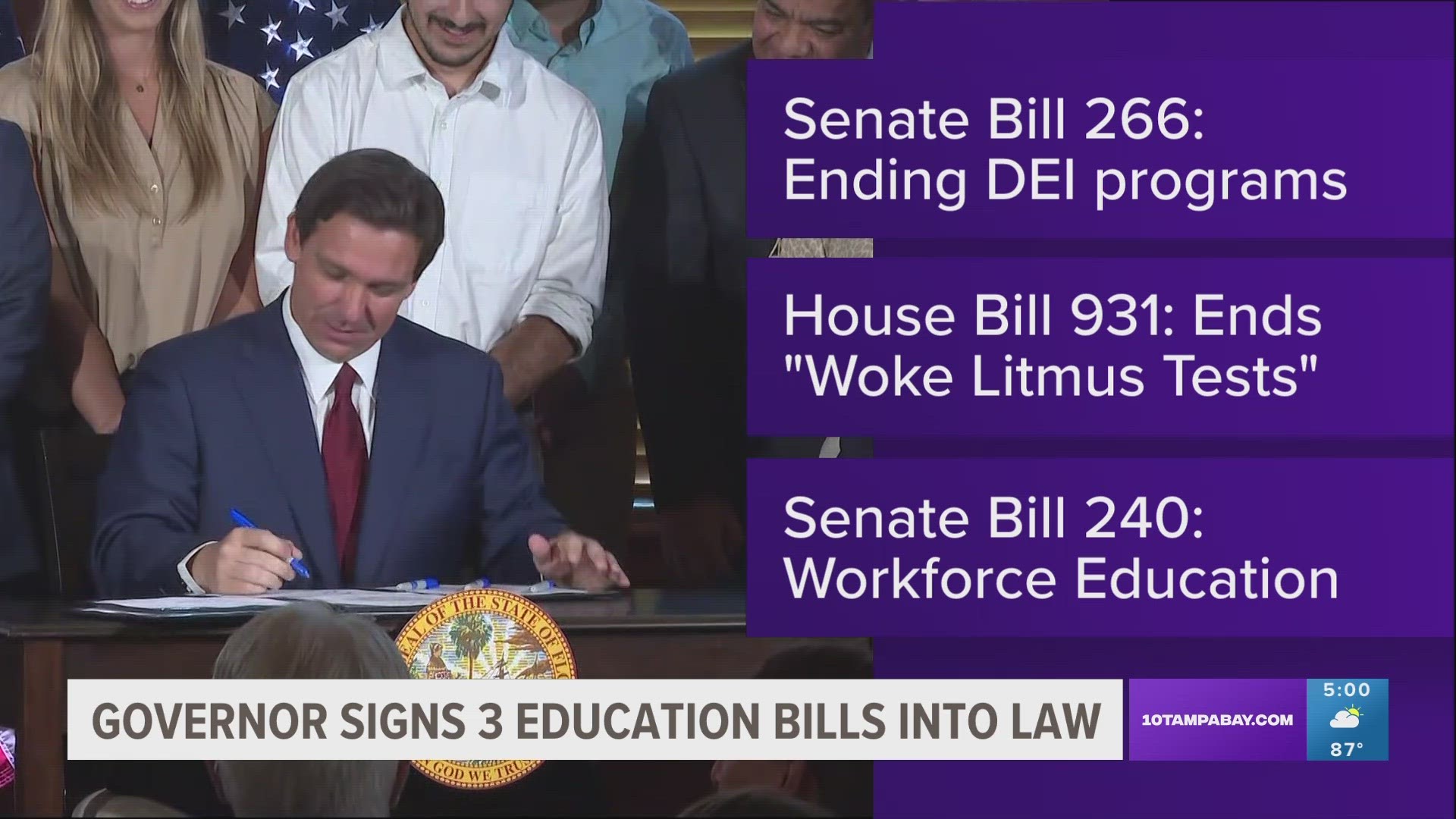SARASOTA, Fla. — Gov. Ron DeSantis signed three bills into law Monday morning to bring sweeping changes to the state's colleges and universities, asserting they will bolster Florida's position in education.
Critics, however, charge the new laws politicize higher education and reduce free speech by dictating what can and cannot be discussed in the classroom.
The governor spoke at the New College of Florida, which has been the target of DeSantis to remove what he calls left-leaning "woke" indoctrination on campuses across the state. Earlier this year, he and allies reformed New College's 13-member Board of Trustees and installed mostly conservative members.
Board members then fired the college president, replacing her with former state education commissioner Richard Corcoran, and voted to dismantle the office that handles diversity, equity and inclusion programs.
The governor says the new laws will bring "more accountability to the higher education system" and further support a recent U.S. News and World Report report showing Florida ranking No. 1 in higher education.
Here's a breakdown of the three bills signed.
This Senate bill is aimed at ending diversity, equity and inclusion — commonly referred to as DEI — programs, along with critical race theory spending in higher education, a flyer passed out during the news conference explains.
Now signed into law, starting on July 1, it will be prohibited for higher education institutions from spending public money on DEI or other initiatives that "promote dangerous political and social activism."
It will also prohibit the teaching of CRT, DEI and other related theories in general education courses – along with blocking programs, majors, minors and curricula based on those theories and others similar to them.
While it also prohibits accreditation agencies from requiring Florida institutions to break state law, it will now be required for institutions to submit a list of general education sources for approval each year.
"This year eliminate valueless courses, and assist our students in efficiently completing their degrees," the flyer read, in part.
According to DeSantis, SB 266 will re-empower university presidents to be the decision maker at schools by "prohibiting personnel actions from being appealed beyond the university president."
"In reality, DEI attempts to impose orthodoxy and this has been used as a veneer to push an ideological agenda and that's wrong," DeSantis said. "If you look at the way, this has been implemented across the country.
"DEI better stands for discrimination, exclusion, indoctrination and that has no place in our public institutions."
The bill also provides nearly $180 million to various programs including recruiting teachers, and establishing civic and traditional education.
- $100 million to recruit and retain high-quality teachers
- $30 million to the Hamilton Center for Classical and Civic Education at the University of Florida
- $8 million to reinvigorate the Florida Institute of Politics at Florida State University and renames it to the Florida Institute of Governance and Civics
- $5 million to expand the Adam Smith Center for Study of Economic Freedom at FIU
- $35 million in new funding at New College of Florida to help it truly become the state's Honors College
State Rep. Anna Eskamani, D-Orlando, called the law "destructive" that "targets diverse students like me." She noted it contains language from the Stop Woke Act the governor signed into law last year, which was temporarily blocked by a federal judge.
"This is a destructive law that targets diverse students like me and our ability to thrive in higher education institutions. It also suppresses academic freedom and inserts conservative political orthodoxy into the classroom. It further politicizes higher education and reduces free speech by dictating specific content that can and cannot be discussed," Eskamani said. "This bill’s vague definitions and sweeping changes opens up the door for abuse and suppression by political bodies like the Board of Governors and pushes the “Anti-Woke” Act back on universities despite the fact that a federal judge has stopped that policy from being implemented in higher education.
"I would not be who I am today or where I am today if it was not for Florida’s State University System. We must continue to fight back, and defend our students and faculty in the face of this [sic] politically motivated laws."
According to DeSantis, this bill's goal is to end what is described as "woke litmus tests."
Starting July 1, HB 931 will block public institutions of higher education from requiring students, faculty and staff to sign in support of DEI or other "ideological agendas" before attending or working at the school.
"What we've seen across the country [is] schools requiring professors to commit to DEI and CRT theories before they are allowed to be hired at a university," DeSantis said. "That is not going to fly in the state of Florida. We want people to be free thinkers."
Through this bill, an Office of Public Policy Events will be made at each of the state universities. This will help organize events on campus that "are representative of a wide range of viewpoints, thoughts and ideas."
Each office will be required to sponsor at least four events in a year.
With the thought of making Florida No. 1 for workforce education by 2030, DeSantis signed this bill into law.
Once taking effect on July 1, the REACH Office will be expanded – creating more apprenticeship and pre-apprenticeship programs across the state.
The bill also authorizes state universities to create workforce education programs using on-the-job training.
According to the flyer, this bill will require each school district to "ensure that all high school students have access to work-based learning opportunities." It also requires each high school to host a career fair sometime during the school year.
SB 240 will allow middle school students to continue their CTE education at any high school offering a program they want to pursue – regardless of the ZIP code.

